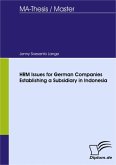Inhaltsangabe:Introduction: In this thesis, I will strive to understand how German companies can be successful in post-Communist Bulgaria and why they might want to move their operations to Bulgaria. The central objective of this thesis is to assess the post-Communist business environment for German companies in Bulgaria. Hence, I will closely examine the present legal and economical environment of Bulgaria and will demonstrate the realm of opportunities this country has to offer to Western European entrepreneurs. Indeed the thesis can be presented that: German companies may avoid the disadvantages of globalisation by moving operations to Bulgaria. In order to highlight certain possibilities and achievements I will refer to German companies, which have already successfully built up operations in Bulgaria. One way to successfully analyse a certain industry, country or region is by applying a SWOT analysis. Especially the transition countries in Eastern Europe are interesting to analyse, because the region is faced with many opportunities as well as threats to the changing process. Consequently, reference will be made to the theoretical framework of a SWOT analysis. The SWOT analysis provides a broad overview of the situation of a country and should, therefore, be applied on the transforming countries such as Bulgaria. Further I will also deal with the question of Foreign Direct Investment, its main motives and Bulgarian legal framework. Before I begin to analyse Bulgaria¿s present economical, social and political situation, however, I believe it is necessary to provide a brief historical overview of the period, which preceded the imposition of communism, along with the performance of the Communist regime and its legacy. This seems especially vital since the Communist period shaped and controlled Bulgarian society for well over 40 years. As Emil Giatzidis states in his book An introduction to post-Communist Bulgaria: Political, economic and social transformation ¿Communist regimes had no civil society since Communist society was totally patronised and controlled by a party that was equivalent to the state.¿ Therefore, in all cases of former Communist countries special attention should be given to the issue of economic consolidation, since, as Giatzidis further argues ¿the implementation of programmes to stabilise and more fundamentally to reform economies have posed formidable political challenges that have implications that go well beyond their [...]
Dieser Download kann aus rechtlichen Gründen nur mit Rechnungsadresse in A, B, BG, CY, CZ, D, DK, EW, E, FIN, F, GR, HR, H, IRL, I, LT, L, LR, M, NL, PL, P, R, S, SLO, SK ausgeliefert werden.









